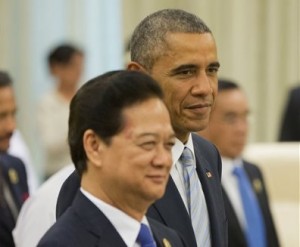Obama and other leaders wrap up Asia summit
NAYPYITAW, Myanmar — United States President Barack Obama and other world leaders wrapping up a series of summits in Myanmar on Thursday are expected to offer tepid expressions of concern about issues ranging from territorial disputes in the South China Sea to the Islamic State group and no firm recommendations.
But some experts still say the meeting is more than just a talk-shop, and that it is a chance for political foes to sit down together in a safe atmosphere.
Millions of dollars are spent hosting Association of Southeast Asian Nations and the East Asia summits, and Myanmar — emerging only recently from a half century of dictatorship — ran the two-day event in its purpose-built capital Naypyitaw with military-like discipline.
More than 1,300 journalists were given superficial access to participants, watching from a safe distance as participants were ushered in and out of cavernous meeting a halls and then then shuttling back to a far-removed media center.

U.S. President Barack Obama, right, and Vietnamese Prime Minister Nguyen Tan Dung arrive at a U.S.-ASEAN (Association of South East Asian Nations East Asia) session at the Myanmar International Convention Center, Thursday, Nov. 13, 2014 in Naypyitaw, Myanmar. AP
Presidents and prime ministers from 10 Southeast Asian nations met Wednesday and were joined Thursday by Obama and leaders from China, India, South Korea and Thailand, among others.
Below are highlights from the draft ‘final’ statements, which were written ahead of the meetings and circulated even before the talks began:
The South China sea
Territorial disputes in the South China Sea, which is of tremendous strategic importance to everyone, including Washington, need to be solved peacefully and through dialogue. Southeast Asian nations and China should work toward the early conclusion of a Code of Conduct in the South China Sea.
Ebola
Ebola poses a global threat to peace and security and relief assistance is needed to help fight the deadly virus in the hardest-hit West Africa nations, home to most of the world’s 5,000 deaths. When necessary, leaders from Southeast Asian nations will seek technical assistance from the World Health Organization to help detect and respond to public health threats.
Islamic state group
Participants reiterated that they supported efforts to restore law and order inside Iraq as it — and the world at large — struggles with threats posed by the Islamic State group. They called on Iraq and international partners to ensure the protection of civilians and access to humanitarian assistance for those affected by the conflict. They demanded the immediate, safe and unconditional release of all those who are kept hostage by the group or associated individuals and entities.
The Association of Southeast Asian Nations summit on Wednesday and the East Asia Summit on Thursday bring together more than 18 leaders. They include Obama, Chinese Premier Li Keqiang, Russian Prime Minister Dmitry Medvedev, South Korean President Park Geun-hye and Indian Prime Minister Narendra Modi. This is the first Asean summit for newly elected Indonesian President Joko Widodo.
RELATED STORY